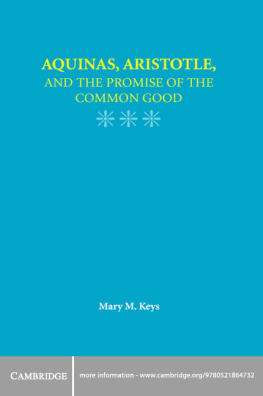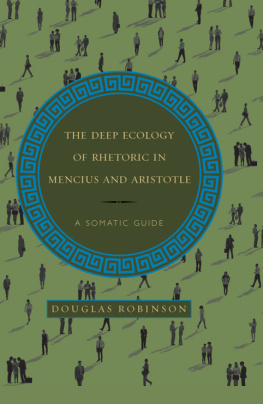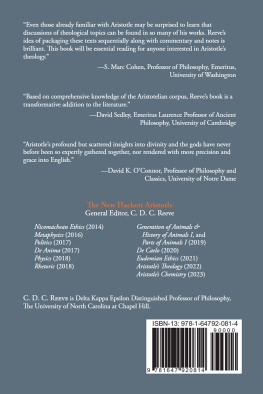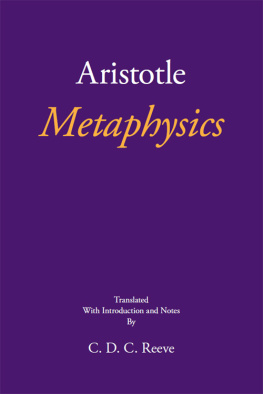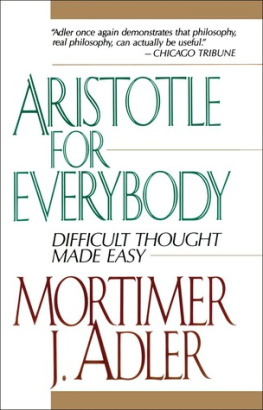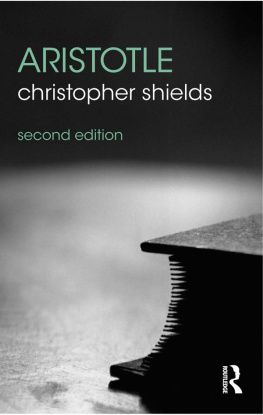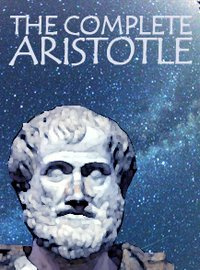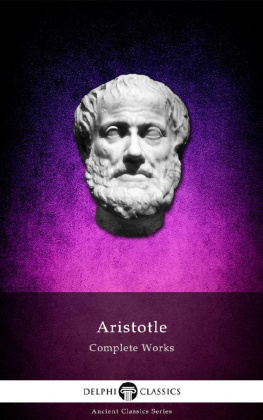Aristotle Aristotle. - Aquinas, Aristotle, and the Promise of the Common Good
Here you can read online Aristotle Aristotle. - Aquinas, Aristotle, and the Promise of the Common Good full text of the book (entire story) in english for free. Download pdf and epub, get meaning, cover and reviews about this ebook. City: Cambridge, year: 2007, publisher: Cambridge University Press, genre: Politics. Description of the work, (preface) as well as reviews are available. Best literature library LitArk.com created for fans of good reading and offers a wide selection of genres:
Romance novel
Science fiction
Adventure
Detective
Science
History
Home and family
Prose
Art
Politics
Computer
Non-fiction
Religion
Business
Children
Humor
Choose a favorite category and find really read worthwhile books. Enjoy immersion in the world of imagination, feel the emotions of the characters or learn something new for yourself, make an fascinating discovery.
- Book:Aquinas, Aristotle, and the Promise of the Common Good
- Author:
- Publisher:Cambridge University Press
- Genre:
- Year:2007
- City:Cambridge
- Rating:3 / 5
- Favourites:Add to favourites
- Your mark:
- 60
- 1
- 2
- 3
- 4
- 5
Aquinas, Aristotle, and the Promise of the Common Good: summary, description and annotation
We offer to read an annotation, description, summary or preface (depends on what the author of the book "Aquinas, Aristotle, and the Promise of the Common Good" wrote himself). If you haven't found the necessary information about the book — write in the comments, we will try to find it.
Aquinas, Aristotle, and the Promise of the Common Good — read online for free the complete book (whole text) full work
Below is the text of the book, divided by pages. System saving the place of the last page read, allows you to conveniently read the book "Aquinas, Aristotle, and the Promise of the Common Good" online for free, without having to search again every time where you left off. Put a bookmark, and you can go to the page where you finished reading at any time.
Font size:
Interval:
Bookmark:

Aquinas, Aristotle, and the Promise of the Common Good
Aquinas, Aristotle, and the Promise of the Common Good claims that contemporary theory and practice have much to gain from engaging Aquinass normative concept of the common good and his way of reconciling religion, philosophy, and politics. Examining the relationship between personal and common goods, and the relation of virtue and law to both, Mary M. Keys shows why Aquinas should be read in addition to Aristotle on these perennial questions. She focuses on Aquinass Commentaries as mediating statements between Aristotles Nicomachean Ethics and Politics and Aquinass Summa Theologiae , showing how this serves as the missing link for grasping Aquinass understanding of Aristotles thought in relation to Aquinass own considered views. Keys argues provocatively that Aquinass Christian faith opens up new panoramas and possibilities for philosophical inquiry and insights into ethics and politics. Her book shows how religious faith can assist sound philosophical inquiry into the foundations and proper purposes of society and politics.
MARY M. KEYS is associate professor of political science at the University of Notre Dame. She has received fellowships from the Erasmus Institute at the University of Notre Dame; the Martin Marty Center for Advanced Study of Religion at the University of Chicago, the Earhart Foundation, and the George Strake Foundation, among others. Most recently, she has been awarded a fellowship from the National Endowment for the Humanities for research on Humility and Modern Politics in 20067. Her articles have appeared in the American Journal of Political Science and History of Political Thought .
Mary M. Keys
University of Notre Dame

Cambridge, New York, Melbourne, Madrid, Cape Town, Singapore, So Paulo
Cambridge University Press
32 Avenue of the Americas, New York, NY 10013-2473, USA
www.cambridge.org
Information on this title: www.cambridge.org/9780521864732
Mary M. Keys 2006
This publication is in copyright. Subject to statutory exception
and to the provisions of relevant collective licensing agreements,
no reproduction of any part may take place without
the written permission of Cambridge University Press.
First published in print format 2006
ISBN-13 978-0-511-25767-4 mobipocket
ISBN-10 0-511-25767-8 mobipocket
ISBN-13 978-0-521-86473-2 hardback
ISBN-10 0-521-86473-9 hardback
Cambridge University Press has no responsibility for the persistence or accuracy of URLs for external or third-party Internet Web sites referred to in this publication and does not guarantee that any content on such Web sites is, or will remain, accurate or appropriate.
My Teachers,
Especially My Parents
Contents |
| 1 |
| 1.1 |
| 1.2 |
| 1.3 |
| 2 |
| 2.1 |
| 2.2 |
| 2.3 |
| 3 |
| 3.1 |
| 3.2 |
| 3.3 |
| 4 |
| 4.1 |
| 4.2 |
| 4.3 |
| 5 |
| 5.1 |
| 5.2 |
| 5.3 |
| 6 |
| 6.1 |
| 6.2 |
| 6.3 |
| 7 |
| 7.1 |
| 7.2 |
| 7.3 |
| 8 |
| 8.1 |
| 8.2 |
| 8.3 |
| 8.4 |
| 9 |
| 9.1 |
| 9.2 |
| 9.3 |
This book, or whatever is good in it, is truly a common good. I am delighted to thank some of the many teachers, colleagues, family members, and friends without whose help this book never would have come to be, or would have come to be quite differently. Because I am, alas, a quintessentially absent-minded professor, I first want to apologize to and to thank anyone I have accidentally omitted here.
My first debt is to my teachers. Christopher Bruell introduced me to political philosophy when I was a freshman at Boston College and inspired me to continue its study. I owe to him an abiding interest in Platos and Aristotles works and in ancient Greek political thought generally. The late theologian and political theorist Ernest Fortin directed my undergraduate thesis and later suggested that I study the common good in Aquinass thought. That Fr. Fortins other suggestion for my dissertation was the rediscovery of Aristotle in the Latin West is, in the context of this book, one more indicator of how profound my intellectual debt is to this learned and generous man. Peter Kreeft, Marc Landy, and Mark OConnor were also for me the best of teachers in undergraduate philosophy, political science, and great books courses, respectively.
At the University of Toronto, Clifford Orwin and Thomas Pangle were my graduate mentors, teaching outstanding seminars in ancient and modern political philosophy. Cliff Orwin excelled, as he still does, at prompting me to laugh, chiefly at myself. Tom Pangle, beyond directing my dissertation, somehow convinced me before I had even defended my proposal to apply for a job at the University of Notre Dame, where I have been ever since. The late Edward Synan of Torontos Pontifical Institute of Medieval Studies worked with me in a year-long directed readings course on Augustines City of God . He combined deep intellectual seriousness with childlike delight and wonder, and so made learning more lovable for his students. During a year of independent study in philosophy at the University of Navarre I benefited greatly from the assistance of Rafael Alvira, Alfredo Cruz, and Alejandro Llano.
My second book-related debt is in many ways no less than the first: my colleagues at Notre Dame have been for me true treasures of prudence and wisdom and constant sources of encouragement. Here it is hard to know with whom to begin, so I will proceed alphabetically, thanking from the heart Jim McAdams, department chair during several of my critical early years on Notre Dames faculty; Ralph McInerny, who graciously and repeatedly assisted a fledgling student of Aquinas in her work; John Roos and David Solomon, whose colleagueship went from the start and still goes far beyond the call of duty; Catherine Zuckert, who has given me a wonderful example of a woman who is a leading scholar in my field and a very faithful friend; and her husband, Michael Zuckert, who as my departmental senior faculty mentor has been incredibly generous in reading my work, providing critical feedback on several versions of this manuscript. I would also like to mention with gratitude the assistance, encouragement, and insights received over the years from many other Notre Dame colleagues, including Ruth Abbey, Eileen Botting, Gerry Bradley, Fred Crosson, Fred Freddoso, Edward Goerner, John Jenkins, C.S.C., Alasdair MacIntyre, Walter Nicgorski, David OConnor, Paul Weithman, and the late Jean T. Oesterle, a great translator with whom I shared an office during the 19956 academic year and whom I miss very much.
Several colleagues from other institutions have helped to improve this book with comments on earlier versions of the whole manuscript, individual chapters, or related pieces of work. In this regard I am indebted especially to J. Brian Benestad, Kenneth Deutsch, Rebecca Konyndyk DeYoung, Harvey Mansfield, Christopher Wolfe, and the members of the 20001 Erasmus Institute Fellows Seminar. I am deeply indebted to Cambridge University Press, especially to senior humanities editor Beatrice Rehl, who has been wonderful to work with throughout the review and publication process. I am also most grateful to senior political science editor Lewis Bateman for first taking an interest in this manuscript, and to production editor Louise Calabro and copy editor Helen Greenberg for their expert and eagle-eyed assistance. For permission to reprint, with some small changes, previously published articles as chapters in this book, I thank History of Political Thought and the Imprint Academic (for chapter , originally Aquinass Two Pedagogies: A Reconsideration of the Relation between Law and Moral Virtue in AJPS 45/3, 2001). I have also benefited from consulting an unpublished translation by Ernest Fortin of Aquinass Commentary on Aristotles Politics.
Font size:
Interval:
Bookmark:
Similar books «Aquinas, Aristotle, and the Promise of the Common Good»
Look at similar books to Aquinas, Aristotle, and the Promise of the Common Good. We have selected literature similar in name and meaning in the hope of providing readers with more options to find new, interesting, not yet read works.
Discussion, reviews of the book Aquinas, Aristotle, and the Promise of the Common Good and just readers' own opinions. Leave your comments, write what you think about the work, its meaning or the main characters. Specify what exactly you liked and what you didn't like, and why you think so.

